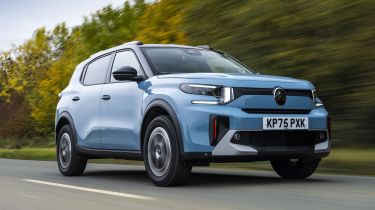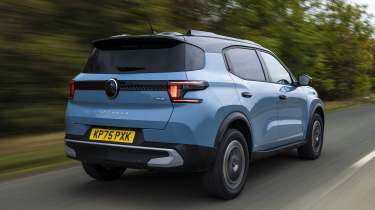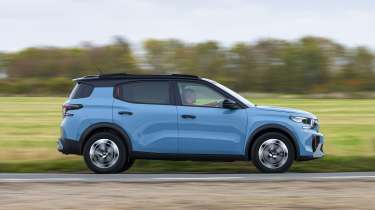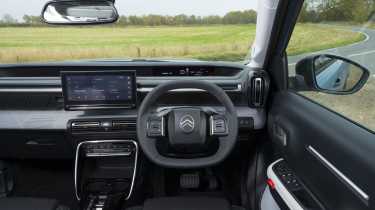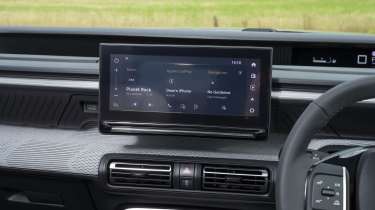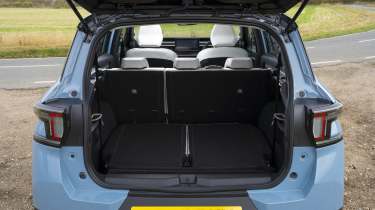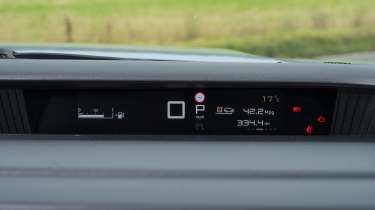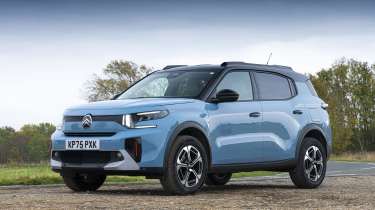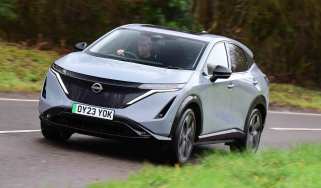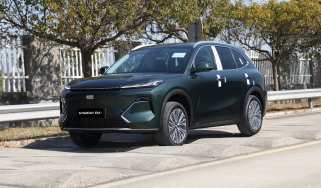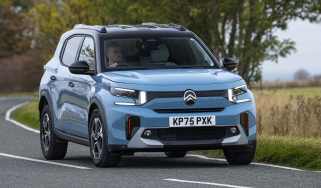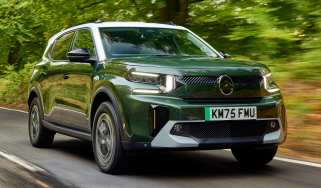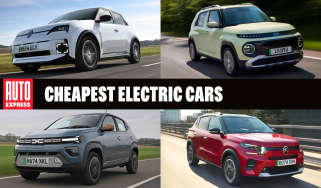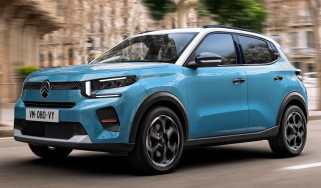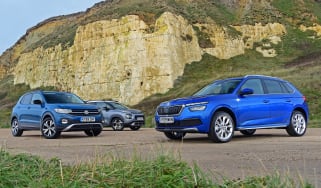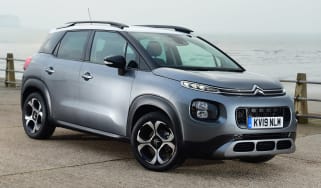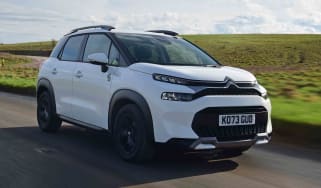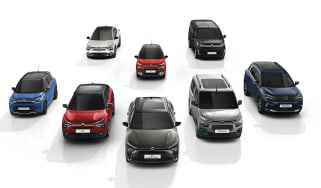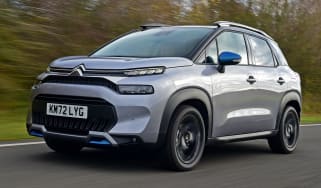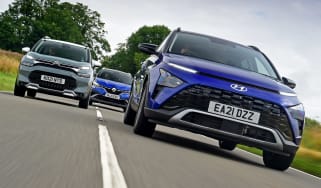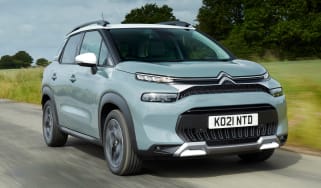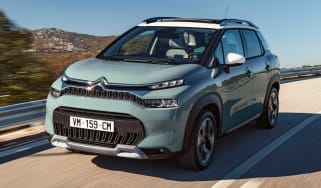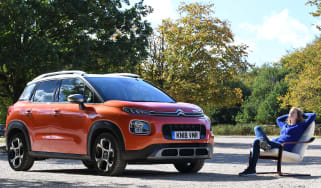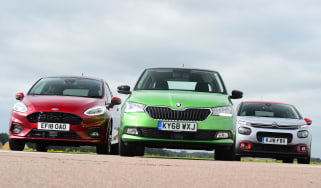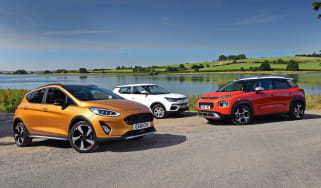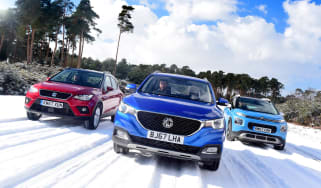Citroen C3 Aircross review
The second-generation C3 Aircross has grown to offer more space at a good-value price

Our opinion on the Citroen C3 Aircross
The Citroen C3 Aircross has grown in stature, but not so much in price, and it easily merits the description, ‘a lot of car for the money’. There’s virtual price parity between the petrol and electric variants, and what you get for your money is a roomy family SUV that has more compact overall dimensions than most rivals. You can add a seven-seat option to the petrol models, although boot space is sacrificed to fit the seats in, but it does mean the C3 Aircross is one of the cheapest seven-seat cars on the market. The driving experience majors on comfort over driving fun, but as everyday family transport, it gets the job done with a bit of comfort thrown into the mix.
About the Citroen C3 Aircross
The original C3 Aircross quickly became one of our favourite small SUVs. Part of the reason why we loved it so much is that it offered something genuinely different from the rest of the crowd; where most rivals looked sharp and tried to offer a pretence of sportiness from behind the wheel, the C3 Aircross felt just as soft to drive as it looked. We felt its comfort and space made it one of the most likeable cars in the class.
Used - available now

2021 Citroen
C3 Aircross
16,983 milesAutomaticPetrol1.2L
Cash £13,800
2018 Citroen
C3 Aircross
31,768 milesManualPetrol1.2L
Cash £8,423
2021 Citroen
C3 Aircross
22,258 milesAutomaticPetrol1.2L
Cash £11,799
2020 Citroen
C3 Aircross
42,724 milesManualPetrol1.2L
Cash £8,599The new model has grown in size, with a body that’s 235mm longer than the old version’s, enabling the fitment of seven seats, which is very unusual in a car of this size.
But while the shape has grown more boxy, the driving experience clings to the softness that we’ve come to expect from Citroen – and this works well with the three powertrain options that are offered this time around.
The petrol, hybrid or fully electric drive systems give buyers of the C3 Aircross (or e-C3 Aircross, as the EV version is known) a level of choice that few other models can match in this segment. It’s worth bearing in mind, however, that the e-C3 Aircross isn’t able to accommodate seven people; it’s only got five seats, although they are very roomy.
Citroen C3 Aircross prices and latest deals
The Citroen C3 Aircross range starts from around £21,000 for the petrol model, although you can find savings of nearly £2,000 at the Auto Express Buy A Car service, with monthly rates starting from less than £300. The electric e-C3 Aircross starts from around £2,000 extra, although current incentives all but cancel out the price difference over the petrol. The Hybrid model is the most expensive variant, starting from around £24,500. Adding seven seats to the petrol or hybrid models adds £765 to the list price, while there’s a difference of £2,000 between Plus and higher-spec Max trim levels.
Engines, performance & drive
Pros |
|
Cons |
|
With some small exceptions, the C3 Aircross has Citroen’s hallmarks of relaxation and comfort. It’s not the last word in sophistication, but it’s competent where it counts.
Trying to produce comfort in a value-driven B-segment vehicle seems like a tall order when you factor in the inherent lack of sound deadening, interior quality, suspension sophistication and powertrain refinement at the price point of the C3 Aircross.
| Model | Power | 0-62mph | Top speed |
| C3 Aircross PureTech 100 | 99bhp | 10.6 seconds | 114mph |
| C3 Aircross Hybrid 136 | 134bhp | 10.1 seconds | 120mph |
| e-C3 Aircross Standard Range | 111bhp | 11.7 seconds | 89mph |
| e-C3 Aircross Extended Range | 111bhp | 13 seconds | 89mph |
Performance, 0-60mph acceleration and top speed
Sharing its “Smart Car” platform with the C3, the C3 Aircross uses the same 1.2-litre turbocharged unit as the base for its petrol engine. However, with Citroen well aware that the seven-seat layout might demand a little more shove than the 109bhp hybrid in the smaller car, the petrol/electric set-up gets a boost here, making the same 143bhp as the hybrid unit in the Peugeot 3008. That results in really strong performance; 0-62mph takes 8.3 seconds, and while we didn’t load the car with seven people, we’re confident that the instant shove of the electric motor combined with a total torque of 205Nm will be plenty for moving the C3 Aircross around.
The system is not quite the slickest hybrid around, but it’s okay. The C3 Aircross moves off from a standstill smoothly before the petrol engine wakes into life; the three-cylinder unit gently vibrates the cabin at idle. We’d like the gearbox to be a little more responsive – it’s slow to react when the driver wants it to kick down, but only a slight jump can be felt when it shifts gears under a more gentle load.
Town driving, visibility and parking
One of the first things that strikes you about the C3 Aircross is just how light the steering is. The tiny wheel is a doddle to twirl at low speeds, making it easy to use when parking or wriggling out of a tight spot.
The turning circle is better than the Dacia Jogger’s, although the automatic gearbox is a little slow to confirm a shift when trying to switch from reverse into drive, and vice versa; the gearbox had a tendency to find neutral unless we were very deliberate when selecting drive or reverse when manoeuvring.
Country road driving and handling
We’ve become familiar with Citroen’s Advanced Comfort suspension across a few of its cars now; by replacing traditional bump stops with what in effect is a second set of dampers, it allows the suspension to be set a little softer, while still controlling the car’s body.
Over larger bumps, the system clearly works exactly as intended; hit a speed bump, or a large undulation or compression in the road, and the C3 Aircross is excellent at taking the harshness out of the impact, giving an almost floaty sensation which makes it much more compliant than similarly sized alternatives.
However, while the system does its job well, it can’t isolate everything. When driving across broken surfaces and smaller, higher-frequency bumps, the car is susceptible to a little patter and fidget, which takes the shine off the sterling work of those secondary dampers. It’s not uncomfortable by any means, and this complaint is partly down to the fact that we expect such high standards for Citroen when it comes to ride comfort.
We didn’t have as high hopes for the handling, and the C3 Aircross failed to exceed our expectations. It’s safe and predictable enough, but feels lethargic, nose-heavy, and the steering passes little to no information back to the driver about the road surface beneath. A Dacia Jogger falls well short of being a driver’s car, but it feels much more agile and positive than the Citroen.
Motorway driving and long-distance comfort
At higher speeds, that soft ride over big bumps really comes into its own. While road and wind noise are a little more intrusive than we’d like, the C3 Aircross is still more refined than its closest rival from Dacia.
Despite being positioned beneath the C4 in Citroen’s range, the C3 Aircross actually features wider tyres. Over scarred roads, we found there was an underlying harshness to the ride and some audible road roar making its way into the cabin, possibly caused by that wider rubber.
"Saving more than £3,500 over the hybrid model is a 99bhp petrol paired with a six-speed manual transmission. The gearbox is a big improvement over Citroen shifts of even five or 10 years ago, but the oddly shaped, oversized gearknob makes it feel more clumsy to use than it could have been. The clutch pedal is reasonably light, although the shifts don’t like to be hurried too much. It also gets a manual handbrake, which is a bit of a novelty these days, but the plastic it’s made from feels really cheap." - Alex Ingram, Chief reviewer
MPG & running costs
Pros |
|
Cons |
|
Fuel consumption proved to be reasonable, if not outstanding, during our time with the C3 Aircross hybrid. Our final figure of 43.8mpg appeared to be a reasonably consistent return regardless of the road type.
Our experience with the 99bhp petrol version has been limited so far, so we can’t draw a conclusive economy figure yet. However, on paper it’s not as frugal as the hybrid, and we suspect the need to work that less powerful engine harder to make progress will have a detrimental effect on its economy.
| Model | MPG | CO2 | Insurance group |
| C3 Aircross PureTech 100 | 47.7mpg | 136g/km | 15 |
| C3 Aircross Hybrid 136 | 53.3mpg | 121g/km | 24 |
Electric range, battery life and charge time
The zero-emissions e-C3 Aircross is the model to go for if you’re particularly environmentally conscious. Its 44kWh battery doesn’t sound like much, and isn’t; as a result the e-C3 Aircross Standard Range tops out at 188 miles of range.
The bigger-battery Extended Range version of the e-C3 Aircross was launched in 2025 and, as the name suggests, it can go further on a charge. Thanks to a larger 54kWh battery, this version provides up to 249 miles (248 miles if you choose the Max trim with its alloy wheels), which, coincidentally, matches the Vauxhall Frontera Long Range.
When we tested the e-C3 Aircross in the mild climate of southern France, we saw an expected range of around 150 miles after some hard driving in the 44kWh model. That’s pretty impressive, but there’s no heat pump, so range is likely to decline quite a bit in colder conditions.
| Model | Battery size | Range | Insurance group |
| e-C3 Aircross | 44kWh | 188 miles | 16 |
| e-C3 Aircross | 54kWh | 248 miles | 15 |
Insurance groups
The Max hybrid is in car insurance group 24. That’s high when compared with the Jogger Hybrid, which is eight to nine groups lower. It’s also the highest-rated model in the C3 Aircross line-up, with the PureTech model in group 15 and the e-C3 Aircross in groups 15 & 16.
Tax
Company car drivers paying Benefit-in-Kind (BiK) tax will find the electric e-C3 Aircross to be their best choice. Both versions are charged at three per cent BiK, which is a lot less than most petrol, diesel, and even hybrid cars. EVs no longer get to use roads for free, so there will be a standard annual vehicle excise duty (VED) fee to consider, which is the same for the petrol and hybrid models, too.
Depreciation
Residual values for the C3 Aircross look very promising, with all petrol and hybrid models maintaining roughly 51 per cent of their original value after three years or 36,000 miles. Citroen expects the Max hybrid, which has marginally the best residual values overall – and therefore delivers competitive monthly finance payments – will be the most popular model with buyers. In comparison, the electric e-C3 Aircross, has a slightly worse 47 per cent figure over the same period.
That’s better than the platform-sharing Vauxhall Frontera, which is only expected to be worth 46 per cent of its list price in petrol form, and a painful 37 per cent in its electric guise. Meanwhile, the MG ZS is expected to do slightly better than the C3 Aircross, hanging on to between 52 and 54 per cent over the same period.
To get an accurate valuation for a specific model, check out our free car valuation tool...
Interior, design & technology
Pros |
|
Cons |
|
The C3 Aircross has a fairly no-nonsense cabin, and it’s more pleasant than the car’s low price point would lead you to believe.
Interior and dashboard design
The C3 Aircross borrows much of its dash design from the C3 supermini. We’re more than happy with that, because it means there’s a fairly clear, logical layout with climate control buttons that feel intuitive to use.
Despite some similarities with the Vauxhall Frontera, the C3 Aircross gets a completely different driver’s display and some neat touches such as the Eiffel Tower and a rooster emblem hidden in the rear side window along with “be cool” and “feel good” labels on the doors.
Materials and build quality
Given the low price point, it’s fair to have modest expectations about the cabin finish, but Citroen’s use of materials helps to lift the C3 Aircross’s interior above the bargain bin. A strip of fabric across the main part of the dash breaks up the black plastic – and patterned ambient lighting bounces off it pleasingly at night. The multi-tone seat fabric adds some light and contrast inside, too.
Infotainment, sat-nav and stereo
The C3 Aircross has Citroen’s latest cabin layout, which uses what it calls a “head-up display” positioned above a tiny steering wheel. The slim digital readout provides only necessary information, with the driver choosing to add more by scrolling through the trip computer functions, which are shown to the right of the readout.
The speedometer is laggy, though, and often skips a few units even when gently accelerating or decelerating. It makes it tricky to tell if you’re either exceeding or observing the speed limit.
The C3 Aircross keeps things fairly simple when it comes to its touchscreen set-up. On the entry-level Plus trim, there isn’t even a built-in navigation system – you’ll need to get the Max trim for that. Both Apple CarPlay and Android Auto are compatible, though, so we’d much rather use the processing power of a phone to navigate and connect our music easily instead. The rest of the set-up is simply laid out with clear icons, and the screen is fairly responsive to touch inputs.
"The C3 Aircross is a lot more boxy than its predecessor. Some of those details have been inspired by the quirky Oli Concept, most notably the lighting design, but we wish Citroen had taken that approach further. While we weren’t expecting it to adopt the wacky cab-forward look of the Oli, we’d have at least welcomed more confident surfacing along the flanks, instead of the slightly soft, undefined look the production car arrives with. The mix of round plastic wheelarch cladding within a squared-off metal panel looks odd, too." - Alex Ingram, Chief reviewer
Boot space & practicality
Pros |
|
Cons |
|
The availability of a seven-seat layout means that the petrol C3 Aircross is essentially unique in its class (the e-C3 Aircross doesn’t get the option due to the battery location). In trying to accommodate seven seats into such a compact car, the end result is certainly versatile, but doesn’t quite offer the outright storage space of other similarly sized models.
Dimensions and size
Dimensions comparison | |||
| Model | Citroen C3 Aircross Mk2 | Citroen C3 Aircross Mk1 | Dacia Jogger |
| Length | 4,395mm | 4,155mm | 4,547mm |
| Width | 1,850mm | 1,765mm | 1,848mm |
| Height | 1,660mm | 1,637mm | 1,691mm |
| Wheelbase | 2,672mm | 2,604mm | 2,898mm |
| Boot space (7/5/2 seats) | 40/330/1,470 litres | N/A/410/1,289 litres | 160/565/2,085 litres |
As you can see from the figures, the second-generation C3 Aircross is a fair bit larger than the old car, and only 250mm shorter than the Citroen C5 Aircross. The Dacia Jogger is longer overall and has a longer wheelbase, hence its larger turning circle, but that also means there’s some boot space on offer when all seven seats are in use.
Seats & passenger space
Thanks to the design of the small steering wheel and slim instrument display, combined with an SUV-like driving position, you get a fairly clear view of the road ahead. At the back, there are fairly large C-pillars, and while an extra pair of small windows take away a small sliver of the blind spot, visibility isn’t quite as strong as in a Dacia Jogger. Citroen’s Advanced Comfort seats, which feature sections of memory foam on the seat cushions, are superbly soft yet supportive.
The second row of seats are more than spacious enough for everyday life. Headroom and foot space are both excellent, while kneeroom is similar to what you’ll find in a family hatchback. The middle seat is wide and soft, too. It’s worth noting that the second-row bench is mounted further forward in seven-seat models in order to accommodate the third row, so the five-seater has even greater legroom. In fact, Citroen claims the C3 Aircross offers best-in-class kneeroom and elbow room for those in the second row.
There are just two USB-C charging ports and a 12V socket in the model we sat in with not a lot of storage. In the hybrid, there’s also a slightly higher central tunnel that impacts rear legroom compared with the electric model.
By Citroen’s own admission, the third row is only best for occasional use by children. An adult of average height will have just enough distance to prevent their knees touching the seat backs in front, but only because the seat base is so low that it barely feels much different from sitting on the floor. Headroom is fine, though, while each third-row passenger gets a cup-holder, plus there’s a USB-C plug to share.
Boot space
In the five-seater, boot capacity is 460 litres, with 1,600 litres available with the rear seats folded. In seven-seat mode, it’s easiest to accept that the C3 Aircross doesn’t really have a boot at all. Officially, there’s 40 litres, but that’s in the form of a tall, slim section behind the upright seat backs that’s barely wide enough for a laptop.
When the back row is folded flat – a simple process thanks to nylon hoop releases on the tops of the seats – the volume grows to 330 litres. A slightly odd floor cover, split into two pieces, covers the seats when they’re folded, to prevent items from falling between gaps.
The second-row seats also drop down, and while they don’t quite lay perfectly flat, there’s little to no step between the folded rows – unlike the Dacia Jogger’s untidier approach. In two-seat configuration, the Aircross offers 1,470 litres – more than a family hatchback with its seats folded down, but well behind the Jogger’s figure of more than 2,000 litres.
Towing
Unlike the Dacia Duster, there’s no four-wheel drive version of the Citroen C3 Aircross – yet both have a maximum 1,500kg towing capacity.
- C3 Aircross PureTech 100 petrol: up to 1,500kg
- C3 Aircross Hybrid 136: up to 1,250kg
- e-C3 Aircross Standard Range: up to 350kg
- e-C3 Aircross Extended Range: up to 350kg
"We tried the rearmost seats for ourselves, and found our legs crushed up against the seats in front, and there was no room for our feet. The Dacia Jogger, on the other hand, can happily seat seven adults. The third-row seats in the C3 Aircross don’t feature Isofix mounting points either." - Alastair Crooks, Senior news reporter
Safety & reliability
Pros |
|
Cons |
|
Having only just launched in 2025, it’s too soon to tell what owners think of the second-generation C3 Aircross, but the old C3 Aircross performed well in the 2025 Driver Power survey. Coming in at a respectable 33rd, the first-generation model was praised for its running costs, exterior design and value – areas where we expect the new model will continue to score well.
Citroen as a whole came 16th out of 31 brands in the 2025 Driver Power manufacturer survey, placing it well above Dacia, Ford, Volkswagen and MG.
In terms of safety kit, every C3 Aircross comes with:
- Reversing camera
- Driver-attention alert
- Lane-departure warning
- Cruise control
- Speed limiter
- Active safety brake
- Hill start assist
Higher-spec Max models benefit from:
- Blind-spot detection
- Front parking sensors
It’s mandatory for speed-limit and lane-departure warning systems to be switched on every time a car is started. Fortunately, Citroen makes both easy to switch off; a long press on two separate buttons to the right of the steering wheel does the trick.
As standard, the C3 Aircross has a three year, 60,000-mile warranty. But Citroen’s We Care package extends that to eight years or up to 100,000 miles if the car’s scheduled services are done at an approved service centre. While the dealer’s services will likely cost more than from an unofficial garage, We Care’s duration is among the longest packages on the market.
Citroen states a service interval of one year or 12,500 miles for the petrol and hybrid versions of the C3 Aircross. A three-year service plan is available, which spreads the cost over monthly payments.
Buying and owning
Our best buy: Citroen e-C3 Aircross Extended Range
If we ignore the EV option, then our pick of the Citroen C3 Aircross range is the Hybrid 136. You have to pay a premium for the electrified powertrain, but you’ll enjoy the extra power, smoother drive and improved efficiency.
As for the e-C3 Aircross, we think it’s well worth plumping for the more expensive Extended Range version, even if the overall kit list doesn’t change. The Aircross works a treat in this guise, and it’s our overall pick as best buy.
Citroen C3 Aircross alternatives
The most obvious rival to the Citroen C3 Aircross is the Vauxhall Frontera, with which it shares its platform and much of its on-board equipment and powertrains. The Citroen’s dashboard is arguably more interesting than the Vauxhall’s dual-screen layout, although for most customers the choice between the two will be determined by which offers a better finance deal.
Elsewhere there’s the Dacia Duster, which doesn’t come with the option of an all-electric powertrain or seven seats, but does beat the hybrid and petrol C3 Aircross for emissions. If you need to head off road, it will also be the better option. Its sister car, the Dacia Jogger, beat the seven-seat C3 Aircross in a twin test, thanks to its battery space in seven-seat mode, as well as having a more efficient hybrid powertrain.
MG is in the mix, too, with its ZS. Like the Citroen, it’s available as a hybrid, and a pure-electric version will return soon. The MG is quicker than the Citroen, but there’s no seven-seat variant available.
Frequently Asked Questions
A three-year or 60,000-mile warranty is included on all new Citroens (or two years with unlimited mileage). The e-C3 Aircross comes with an eight-year or 100,000-mile warranty on its battery, with a 70 per cent capacity base offered.
Deals on the Citroen C3 Aircross and alternatives
